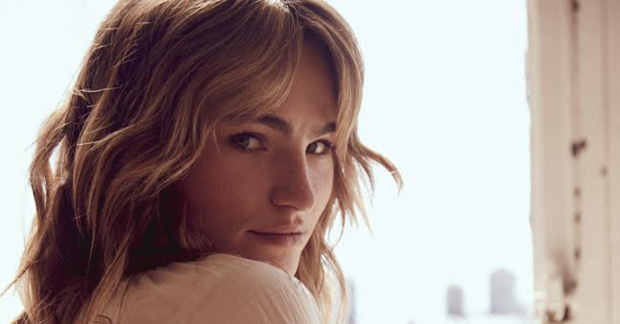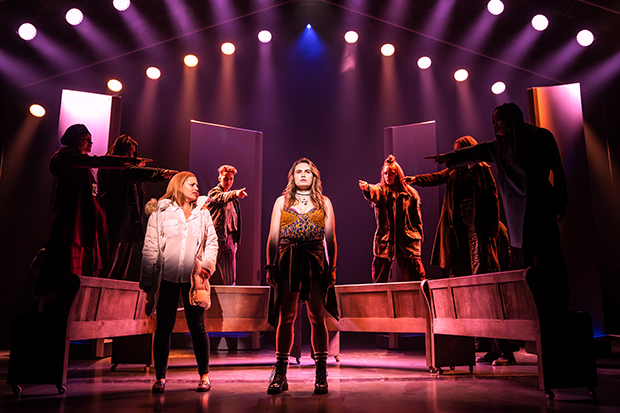Interview: Kathryn Gallagher on Empowering Survivors of Abuse Through Her Role in Jagged Little Pill
Gallagher co-stars in the Alanis Morissette-Diablo Cody musical and earned a Tony nomination for her performance.
The role of Bella in Jagged Little Pill means a lot to Kathryn Gallagher. Sure, she received a 2020 Tony Award nomination for her portrayal, but it's a lot more than that. Bella, who gets two of the show's most important numbers, "Predator" and "No," is a sexual assault survivor who, as in real life, has to fight to get people to believe her.
For Gallagher, it's a very personal character arc, and one that she knows is impacting the lives of audience members, who are unafraid to share their own stories of survival with her. The job inspired her to get involved with Mariska Hargitay's Joyful Heart Foundation, the goal of which is to help heal and empower survivors of assault, abuse, and domestic violence.
Here, Gallagher discusses the evolution of Bella and the importance of the Joyful Heart Foundation's mission.

(© Nathan Johnson)
This conversation has been condensed and edited for clarity.
Tell me about the development of your role.
When I auditioned for Bella, it was a featured ensemble role, with a few lines here and there. I went in for the general chorus calls. They called me back, and that was the first time Diane Paulus was in the room. I got the sides, and it was pretty much the same scene that you have now; it's a big scene where Bella discloses her sexual assault. I had never read anything like it. I remember thinking, "I know this girl and I've been this girl and I've never seen what I had felt." It was so perfectly written, and Diablo Cody has this miraculous way of exploring complicated topics that can be described as a gray area, but in reality is just the truth of being a person.
Three rounds of callbacks later and I was in the ensemble of Jagged Little Pill with this small character, Bella. As we developed it, and once we got to A.R.T. and the audience really started reacting — I was meeting survivors of sexual assault at the stage door, and getting messages from them — it just became clear to the creatives that there was more to be investigated in this story. The role grew and developed, and it was really amazing watching these creative geniuses dive in and flesh out this character and ask for my input. It was like a masterclass in all things creative. And, that was sort of how we got to where the character is now. Like it really had this incredible journey that I got to be along for the ride for.
How do you get through that eight times a week and not be completely depleted?
You don't. It's interesting, it's something that, in the three years leading up to it, I was very nervous about. I was going to choose a more optimistic term, but I think that is the most accurate one. I'm in therapy; that was a nonstarter for me. I was like, "I have to have a full team to help me through this." We worked with Claire Warden, our intimacy coordinator, and she gave me some tools about how to sort of begin the show and end the show and keep it encapsulated as best I could.
But it's impossible. It's a story that I don't relate to T to T, but I relate to it more than I'd like to, and it's impossible to leave that home. Some nights it was really hard. One night, I finished the number, "Predator," and I just started weeping, and that had never happened. But of what made it so rewarding and doable were the people I was surrounded by, and the messages I would get, or the people I would meet at the stage door who would say, "This happened to me 40 years ago and I never told anyone until today" or "For the first time in my life, I told my husband, and I'm going to therapy now."
Every single day was a mental exercise to say, "OK, today you're going to go onstage and tell this story, because every time we tell this story, someone in the audience needs to hear it." And this might be exhausting emotionally, physically, all these things, but this is why you're doing it. And then I got involved with the Joyful Heart Foundation, which reinforced that.

(© Matthew Murphy)
What is the Joyful Heart Foundation?
The Joyful Heart Foundation was started by Mariska Hargitay. As she was doing SVU, she started to hear from a lot of survivors, and she was at a place where she was like, "What do I do with this? I have to change this." She created the Joyful Heart Foundation, and their sort-of number one goal is to end the rape-kit backlog. When I got this role, she was the first person I wrote to because I had to get involved. I'm their newest board member.
Mariska has become like a big sister to me. She's the greatest person on earth. What I've really learned from her is, especially when you're handed this honor, responsibility, joy, dream job, all of these things, is to turn it into something great. If I can contribute in any way to ending the rape-kit backlog, to raising awareness, to speaking to teenagers about consent, I'm down. Let's go.
Given how personal the role is to you, what does the nomination mean to you?
It means a lot. This is not a normal role for me. This is not like, "Oh, I did a job, and it was fun. And thank you for thinking I'm good as an actor." To get this nomination, to recognize this role, which is a girl who doesn't feel heard, who is not believed, who is called every name in the book, who has been made to feel small, who is silenced by her community, all of these things because of something that somebody else did to her…to get that recognition? It's just so poetic. It's so cool.
For more information on the Joyful Heart Foundation, click here.







